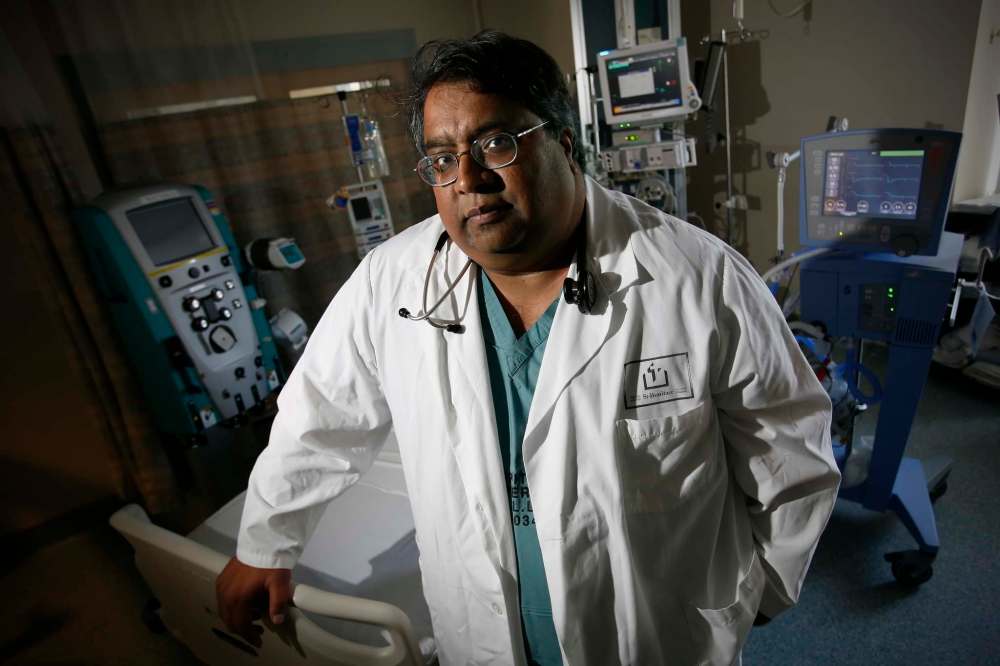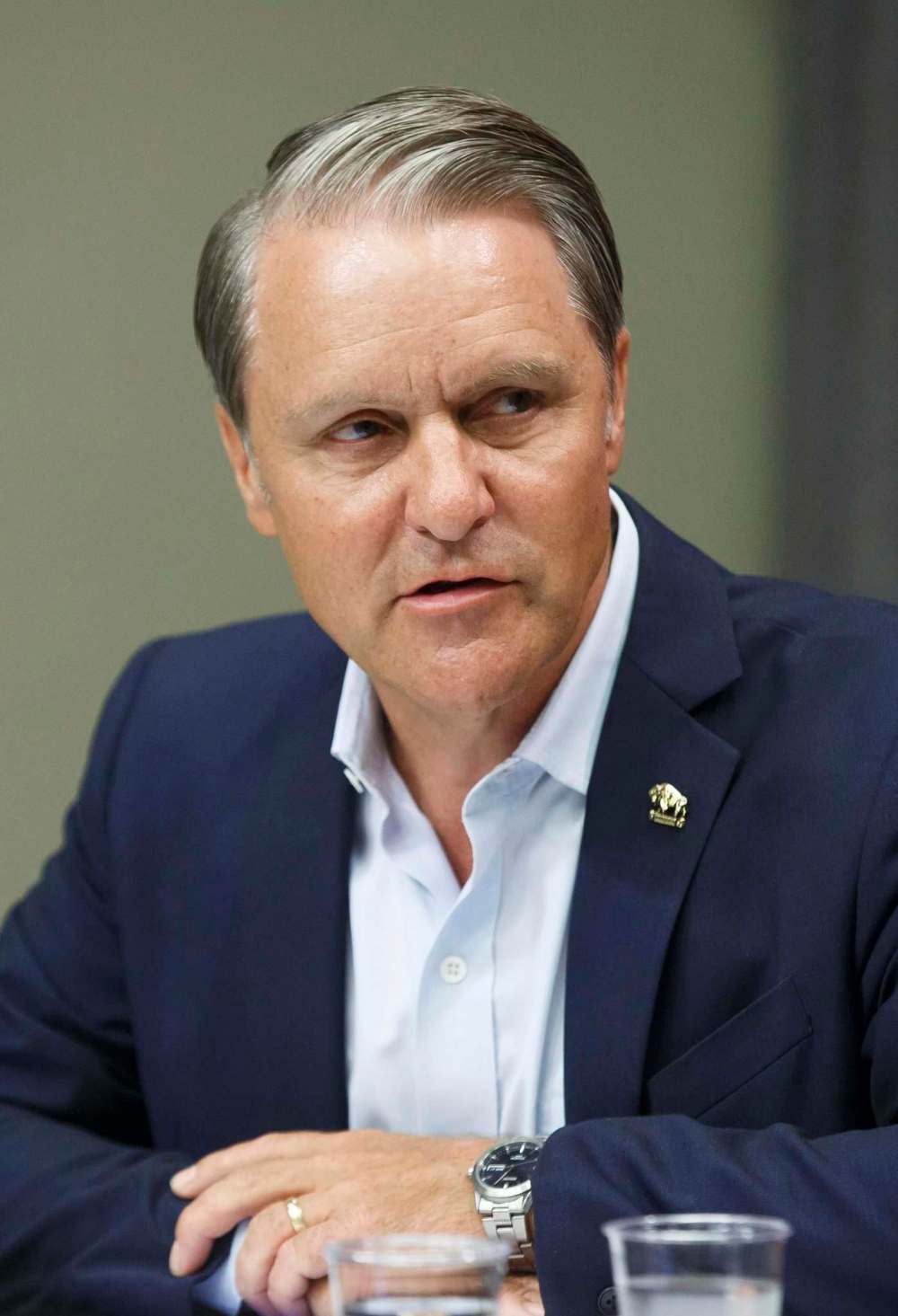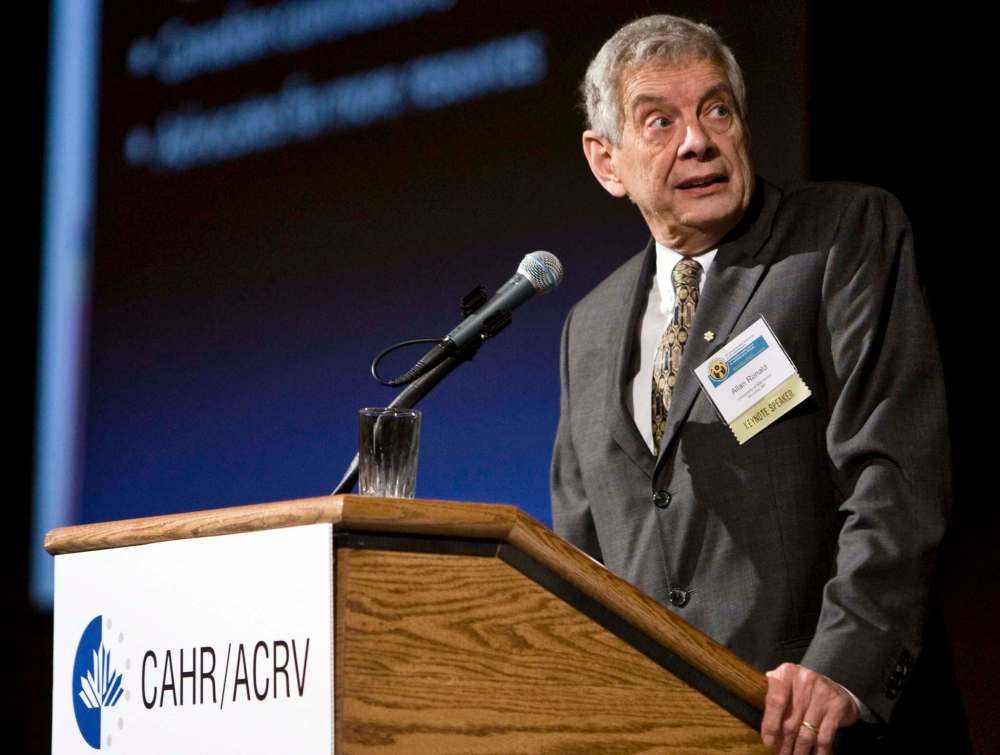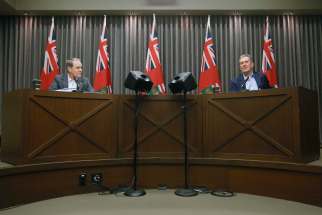Shut down now, doctors tell premier, health minister 'We're in deep trouble based on the numbers we're seeing,' group's open letter warns
Read this article for free:
or
Already have an account? Log in here »
To continue reading, please subscribe:
Monthly Digital Subscription
$0 for the first 4 weeks*
- Enjoy unlimited reading on winnipegfreepress.com
- Read the E-Edition, our digital replica newspaper
- Access News Break, our award-winning app
- Play interactive puzzles
*No charge for 4 weeks then price increases to the regular rate of $19.00 plus GST every four weeks. Offer available to new and qualified returning subscribers only. Cancel any time.
Monthly Digital Subscription
$4.75/week*
- Enjoy unlimited reading on winnipegfreepress.com
- Read the E-Edition, our digital replica newspaper
- Access News Break, our award-winning app
- Play interactive puzzles
*Billed as $19 plus GST every four weeks. Cancel any time.
To continue reading, please subscribe:
Add Free Press access to your Brandon Sun subscription for only an additional
$1 for the first 4 weeks*
*Your next subscription payment will increase by $1.00 and you will be charged $16.99 plus GST for four weeks. After four weeks, your payment will increase to $23.99 plus GST every four weeks.
Read unlimited articles for free today:
or
Already have an account? Log in here »
Hey there, time traveller!
This article was published 29/10/2020 (1867 days ago), so information in it may no longer be current.
A group of 18 doctors is demanding the Tory government impose an immediate provincewide shutdown to avoid a catastrophe that will result in an “appalling and pointless loss of life.”
In an open letter to Premier Brian Pallister and Health Minister Cameron Friesen signed by 10 other medical and health experts, Dr. Anand Kumar — an intensive-care physician with the Winnipeg Regional Health Authority and professor of medicine at the University of Manitoba — said the time to act is now.
An open letter to Minister of Health Cameron Friesen and Premier Brian Pallister:
Given the current trajectory of COVID19 community spread in Manitoba, we physicians have an obligation to indicate our concerns and offer our best advice. We know everyone is working their way through this pandemic as best they can. We’ve not seen anything like it in 100 years.
Given the current trajectory of COVID19 community spread in Manitoba, we physicians have an obligation to indicate our concerns and offer our best advice. We know everyone is working their way through this pandemic as best they can. We’ve not seen anything like it in 100 years.
We agree with you that all Manitobans need to take the COVID19 situation seriously and avoid engaging in activities that can only propagate spread of the virus. However, we’re well past the stage where even a robust community response will significantly slow the epidemic. Fortunately, your government has already shown us what needs to be done.
In the spring of this year, the province and the rest of the world was stricken by the most serious pandemic in living memory. Under your leadership, we crushed the progress of infection within weeks. This past summer, we had several weeks where we suffered no more than two or three cases in total. This hard-fought victory required the support of our communities for a province-wide lockdown for weeks.
Our fellow citizens bore tremendous hardship, but they did so willingly to protect their vulnerable friends, neighbors and family members.
Unfortunately, with the lifting of restrictions, the virus causing COVID19 disease has surged again. The current trajectory of the provincial epidemic suggests that we are early in the exponential phase of growth. To understand what is coming, the experience of El Paso, Texas (like Winnipeg, a city of about 750,000), is instructive.
According to that city’s website, in the week around Oct 1, El Paso had daily case counts of 150 to 200 (similar to what we are experiencing now). Two weeks later, around Oct. 14, case counts had risen to 350 to 550 per day. On Oct. 28, they had about 1,100 cases. This is exponential growth. They currently have 111 patients being mechanically ventilated, with more than 220 in ICU and in excess of 900 admitted to local hospitals.
We simply don’t have that kind of capacity, even with emergency measures. We cannot allow this epidemic to progress unchecked. Despite the commendable efforts of WRHA administration to develop additional bed and ventilator capacity, overall surge capacity will be limited by the availability of front-line health care workers, including nurses, to provide hands-on care and respiratory technicians to operate the ventilators.
Once we reach 200-250 cases per day, we will overwhelm existing resources within a week or two.
At that point, we will be staring at the need for triage; not just for COVID-19 patients, but for all patients who require ICU care. When our citizens need an ICU bed for a stroke or heart attack, it will likely not be available. Patients with acute surgical emergencies or trauma will have to be triaged according to criteria the health authority has certainly already developed.
For those unlucky enough to not meet the triage threshold of likely survival, palliation will likely be the only option. This is not a theoretical consideration; this will happen in less than a month if we do not intervene now.
We anticipate that further impacts will include major delays in emergency-room care, cancellation of elective surgery, delays of urgent surgery and cancer detection and treatment, as well as a high level of illness and death among health-care workers.
Our public-health authority is clearly using an incremental targeted approach (an escalation strategy) to local outbreaks in order to minimize economic disruption. That is a worthy goal, and was worth trying. That’s what a lot of regions around the world have attempted, but their experiences show that this approach is consistently failing.
The reason for this failure is clear: responsible officials have to make decisions before clear evidence emerges that the epidemic is out of control. Absent such evidence, the easy route is an incremental public-health response. But this incremental approach not suited for epidemics involving a rapidly progressive and dangerous infection such as the COVID-19 virus. And it will fail.
By the time definitive evidence of failure of the incremental targeted approach to stop epidemic progression is apparent, it’s too late. You are two or three weeks behind. A targeted intervention we start today might work if that intervention had an immediate impact. It does not. The number of infections we are seeing now was determined by our interventions (or lack of them) several weeks ago.
Similarly, what we do now will determine the level of disease activity and case counts in two to four weeks. When an incremental targeted approach is applied to epidemic management, you’re going to be late every time.
In catastrophic epidemic situations in which a large loss of life is likely, a better approach is what your government mandated in the spring: a maximally aggressive public-health response, including mandated mask use and a province-wide lockdown to damp down the infection level to the greatest extent possible. Then slowly remove restrictions every two or three weeks, while closely monitoring recurrence of infections.
This has the advantage of making the normal delay in the epidemic’s response to your actions work in your favour. You can back off on your intervention (province-wide shutdown) and surveil for increasing test positivity. Once significant increases are seen, you can aggressively contact-trace and quarantine or, if necessary, even tighten up public-activity restrictions again for briefer periods.
If you do this, your daily case counts will increase slowly from a much lower baseline. With good surveillance, the province will be able to maintain very low disease activity levels, similar to this summer, allowing for a sustained resumption of normal economic activity.
We are confident that another aggressive province wide shutdown is coming. We see no real way to avoid that if we continue the current course. We can implement it now and, if we are fortunate, limit deaths to less than double what we have now. Or we can shut down in three weeks and have a death count in the multiple hundreds.
The catastrophic situation we’ve seen in other cities is not inevitable. We are confident that aggressive mitigation efforts, combined with a subsequent ramping up of virus testing, contact tracing and targeted public messaging can avert disaster if implemented immediately.
We urge you to go to a full shutdown immediately. This is the time. A couple of weeks from now will be too late. The result will be an appalling and pointless loss of life and a sustained disastrous impact on the economy.
The signatories of this letter have no political agenda in writing this message. Although the signatories include former medical-school deans, department chairs of medicine, surgery and anesthesia, infectious-diseases and critical-medicine attending staff and city-wide eirectors, director of the public health branch of Manitoba Health and senior physicians/professors of medicine, we are each writing in our individual capacity, many of us as physicians on the front edge of the pandemic response.
Our only concern is the well-being of our fellow Manitobans and health-care workers across the province.
Anand Kumar, MD
Dan Roberts, MD
R. Bruce Light, MD
Eric Jacobsohn, MD
Steven Kowalski, MD
Allan Ronald, MD
Greg Hammond, MD
Fred Aoki, MD
Philippe Lagace-Wiens, MD
Terry Wuerz, MD
Faisal Siddiqui, MD
Kelly McDonald, MD
Sukarno Chaudhry, MD
Joel Enock Nkosi, MD
David Hochmann, MD
Dave Easton, MD
Paddy Griffin, MD
Eric Bow, MD
In an interview, Kumar said that unless stringent, weeks-long shutdown measures — similar to those imposed in Manitoba this past spring — are implemented soon, Winnipeg’s hospitals will treat hundreds more patients infected with COVID-19, and people will die.
“We know right now, no matter what we do, we have 60 deaths now and we will double it to 120…. We’re in deep trouble based on the numbers we’re seeing,” Kumar said in the interview.
“We went from 50 or so people (testing positive for COVID-19) two weeks ago to almost 200 today. Based on pretty standard populations — and no change in our approach — two weeks from now there will be 400 to 500 cases per day and 1,000 two weeks after that.”
Kumar pointed to the experience of El Paso, Texas, a city roughly the same size as Winnipeg. Daily case counts there went from between 150 and 200 at the beginning of October to between 350 and 550 two weeks later. There were about 1,100 cases Wednesday.
Kumar said that’s what will happen here if the province is not shut down.

It’s not the first time a medical professional has penned a letter to Friesen urging the provincial government do more to fight the coronavirus and address the lack of critical care capacity in the health-care system.
Dr. Dan Roberts, a longtime critical-care physician at the Health Sciences Centre and a professor of medicine at the University of Manitoba, has been ringing alarm bells — directly to Friesen — about the shortage of intensive-care unit capacity for more than a year.
‘God forbid we bring it home to our families and our family members die’
By Ryan Thorpe
A nurse at St. Boniface Hospital is speaking out about staff shortages and a lack of effective personal protective equipment as the facility battles a COVID-19 outbreak.
“I don’t feel safe going to work,” said the nurse, whom the Free Press has agreed not to name because she fears she will be fired for talking to the media.
“You should be protected going to your job. Your job should be a safe place. But my job is not a safe place… No one signs up to work through a pandemic where you’re not adequately protected. That’s not being a hero, it’s just ignorance.”
The nurse said she wants the hospital administration to provide N-95 masks to all medical staff. Currently, staff only get access to an N-95 mask if they are with a patient who is a known positive COVID-19 case or doing an aerosol-generating procedure.
A nurse at St. Boniface Hospital is speaking out about staff shortages and a lack of effective personal protective equipment as the facility battles a COVID-19 outbreak.
“I don’t feel safe going to work,” said the nurse, whom the Free Press has agreed not to name because she fears she will be fired for talking to the media.
“You should be protected going to your job. Your job should be a safe place. But my job is not a safe place… No one signs up to work through a pandemic where you’re not adequately protected. That’s not being a hero, it’s just ignorance.”
The nurse said she wants the hospital administration to provide N-95 masks to all medical staff. Currently, staff only get access to an N-95 mask if they are with a patient who is a known positive COVID-19 case or doing an aerosol-generating procedure.
This concern has been echoed by the Manitoba Nurses Union, which has called for N-95 masks to be the baseline for hospital staff, given the high rate of community transmission and rising case counts in Winnipeg.
“In the beginning, they said, ‘We don’t have enough. If we get hit in the fall, what will we do?’ So we only wanted to use N-95s for dire circumstances. But now we’ve had seven, eight months to replenish the supply, to establish a stock, and we’re still being told we don’t have a supply,” the nurse said.
The Free Press requested an interview with Lanette Siragusa, chief nursing officer for Shared Health, on Thursday. The request was denied.
Amy McGuinness, a spokeswoman for Shared Health, declined to provide specific numbers for the stockpile of N-95 masks in Winnipeg hospitals, and at St. Boniface Hospital specifically. Instead, she instructed the Free Press to file a freedom-of-information request.
“We are confident in our current supply. Markets have opened up, orders are being filled and supplies are being delivered. Our stockpile is continuously being replenished and fortified,” McGuinness said in a written statement.
The nurse said she’s worried about staffing levels, which she said are dangerously thin.
“Every single day that I go into work, they’re calling out a code overhead that we’re short-staffed. They’re not even naming the units… All units are short. Every day they’re running shorter and shorter. People are off sick, seemingly more every day,” she said.
The nurse said staff members aren’t coping well with the intense and stressful workload. Increasingly, she said it’s common to hear employees talk jokingly about heading home after their shift to drink a bottle of wine.
“People are coping how they know how to cope and a lot of people have unhealthy coping mechanisms,” she said.
Her concerns aren’t unique, said Darlene Jackson, president of the Manitoba Nurses Union.
“The working conditions in health-care facilities are extremely challenging. Workload has increased dramatically in many instances due to short-staffing and the increased care needs to due COVID-19,” Jackson said in a written statement.
“Unfortunately, we are hearing from nurses who are frustrated by a lack of adequate access to N-95s. In some instances, they are locked up, and nurses have to go through a manager to gain access. In other instances, management discourages the use of N-95s. At a time when containing the spread of COVID is of the utmost importance, we ought to be enhancing protections, not withholding them.”
The nurse said the reality of working in an unsafe environment, without adequate protection, and where management has “belittled” repeated efforts by employees to have their concerns addressed, has been taxing.
“Our needs are not being met. How many times can we say the same thing over and over again. We’re being dismissed,” the nurse said.
“God forbid we bring it home to our families and our family members die. How would we live with ourselves? Or if we gave it to our entire unit? The guilt I would feel. I don’t know how you could live with that.”
ryan.thorpe@freepress.mb.ca
Twitter: @rk_thorpe
In a series of letters sent to Friesen beginning last October obtained by the Free Press, Roberts warned of a near-identical situation to the one Winnipeg currently finds itself in: rising case counts, significant community spread and a hospital system on the verge of being overwhelmed.
Roberts has previous experience managing regional resources through several flu epidemics. In October 2019, he wrote to Friesen asking for “appropriate measures (to) be taken to avert an impending calamity.” He said that due to a lack of intensive-care resources, Winnipeg hospitals wouldn’t be able to “withstand even a moderate influenza epidemic.”
He ended the letter with an ominous warning to Manitoba’s health minister: “I strongly suspect that by January or February we will all profoundly regret not having dealt with this problem. Inquests often have that effect.”
Following the arrival of the pandemic in Manitoba, Roberts continued writing to Friesen to urge the province to take decisive action to curb the spread of the virus.
On Oct. 21, he penned another letter — co-signed by Dr. Pamela Orr, acting head of infectious diseases at U of M, and Dr. Philip St. John, head of geriatrics at U of M — warning that sustaining daily case totals of 200 or more would “quickly overwhelm existing resources.”
The message was simple: unless “aggressive” steps were taken by the provincial government, the situation would soon spiral out of control. The doctors also offered their services to the province, saying they were “willing and eager” to help.

Friesen did not respond to the letters.
Roberts said he’s worried the public doesn’t realize just how close to being overwhelmed the hospital system is. He also said he’s not sure the public recognizes what will happen if it’s pushed over the edge.
“Mortality rates will start to climb as our capacity is exhausted. We’re going to have to start deciding who gets an ICU bed. That’s not going to be restricted to COVID cases. If you get a stroke, a serious heart attack, kidney or liver failure, you will be assessed,” Roberts said.
“Physicians are going to be in the difficult situation of deciding which of these people gets a ventilator, and it’s going to be the one who has the highest chance of survival.”
Speaking to reporters Thursday, Friesen seemed to downplay the risk of hospitals being overwhelmed, saying it is not accurate to say the health-care system is on the brink because ICUs are near capacity.
“We have latent capacity distributed across our health-care system, and at times like this, health-care leaders and system leaders come together and what they do is determine how can we now redeploy workforce from across the system in order to focus on the most important thing,” Friesen said.
Friesen wouldn’t say — one way or the other — whether Winnipeg would be downgraded to red on the pandemic response system in the coming days.
“For those unlucky enough to not meet the triage threshold of likely survival, palliation will likely be the only option.” – Dr. Anand Kumar wrote
However, Roberts countered Friesen’s comments by saying there are not sufficient staffing levels to expand ICU capacity due to a lack of trained critical-care nurses. He added that he hasn’t seen the hospital system this taxed since the peak of the H1N1 epidemic, but he fears the situation is about to go from bad to worse.
“I don’t want to be forced into a situation where I have to deprive patients, who otherwise would have survived, from getting access to life-saving therapy,” he said.
That concern was echoed by the doctors who signed the open letter; continued high case counts will force doctors to make tough decisions about who gets into the ICU.
“For those unlucky enough to not meet the triage threshold of likely survival, palliation will likely be the only option,” Kumar wrote.
“This is not a theoretical consideration — this will happen in less than a month if we do not intervene now.”

Dr. Allan Ronald, a renowned infectious disease expert, a founder of the Ugandan-based Academic Alliance for AIDS Care and Prevention in Africa and an officer of the Order of Canada, is one of those who signed the letter, saying he wholeheartedly supports shutting down the province because of what’s happening.
“If we knew exactly what was happening we’d know what we’d have to do, but we don’t know why… most of us are wearing masks and trying to socially isolate so we think it will get better, but obviously it is getting worse,” Ronald said.
“I think we have to do a shutdown, unfortunately, that hopefully will work this time. I’m 82. We have to be serious with this or otherwise we will just have to let people like me go into the next world.”
— With files from Danielle Da Silva
ryan.thorpe@freepress.mb.ca
kevin.rollason@freepress.mb.ca

Ryan Thorpe likes the pace of daily news, the feeling of a broadsheet in his hands and the stress of never-ending deadlines hanging over his head.

Kevin Rollason is one of the more versatile reporters at the Winnipeg Free Press. Whether it is covering city hall, the law courts, or general reporting, Rollason can be counted on to not only answer the 5 Ws — Who, What, When, Where and Why — but to do it in an interesting and accessible way for readers.
Our newsroom depends on a growing audience of readers to power our journalism. If you are not a paid reader, please consider becoming a subscriber.
Our newsroom depends on its audience of readers to power our journalism. Thank you for your support.
History
Updated on Thursday, October 29, 2020 8:51 PM CDT: Fixes duplication in factbox
Updated on Friday, October 30, 2020 10:03 AM CDT: Clarifies which remarks were made in an interview and which in the open letter
Updated on Friday, October 30, 2020 12:11 PM CDT: Adds text of letter and updates number of doctor signatories.










